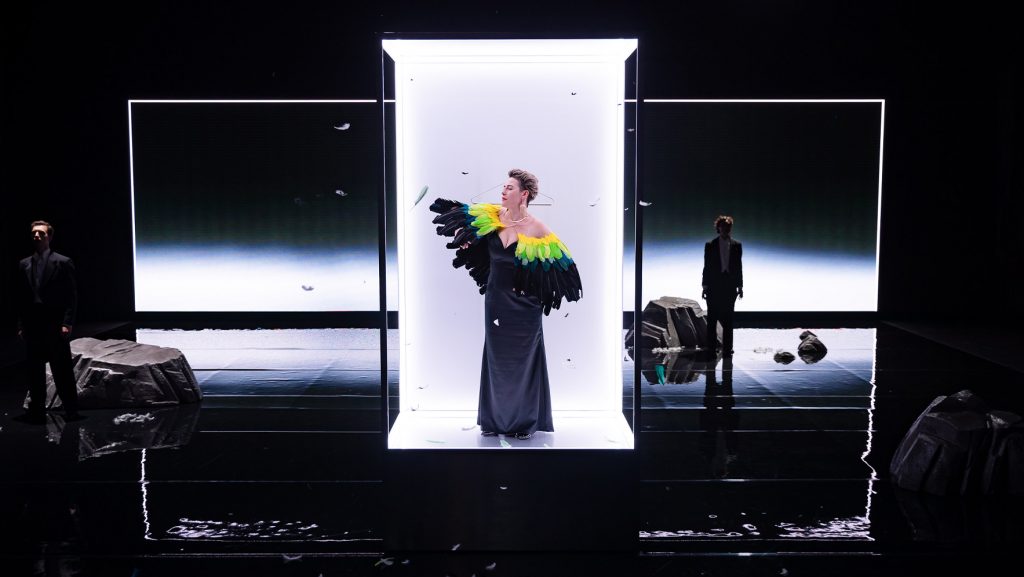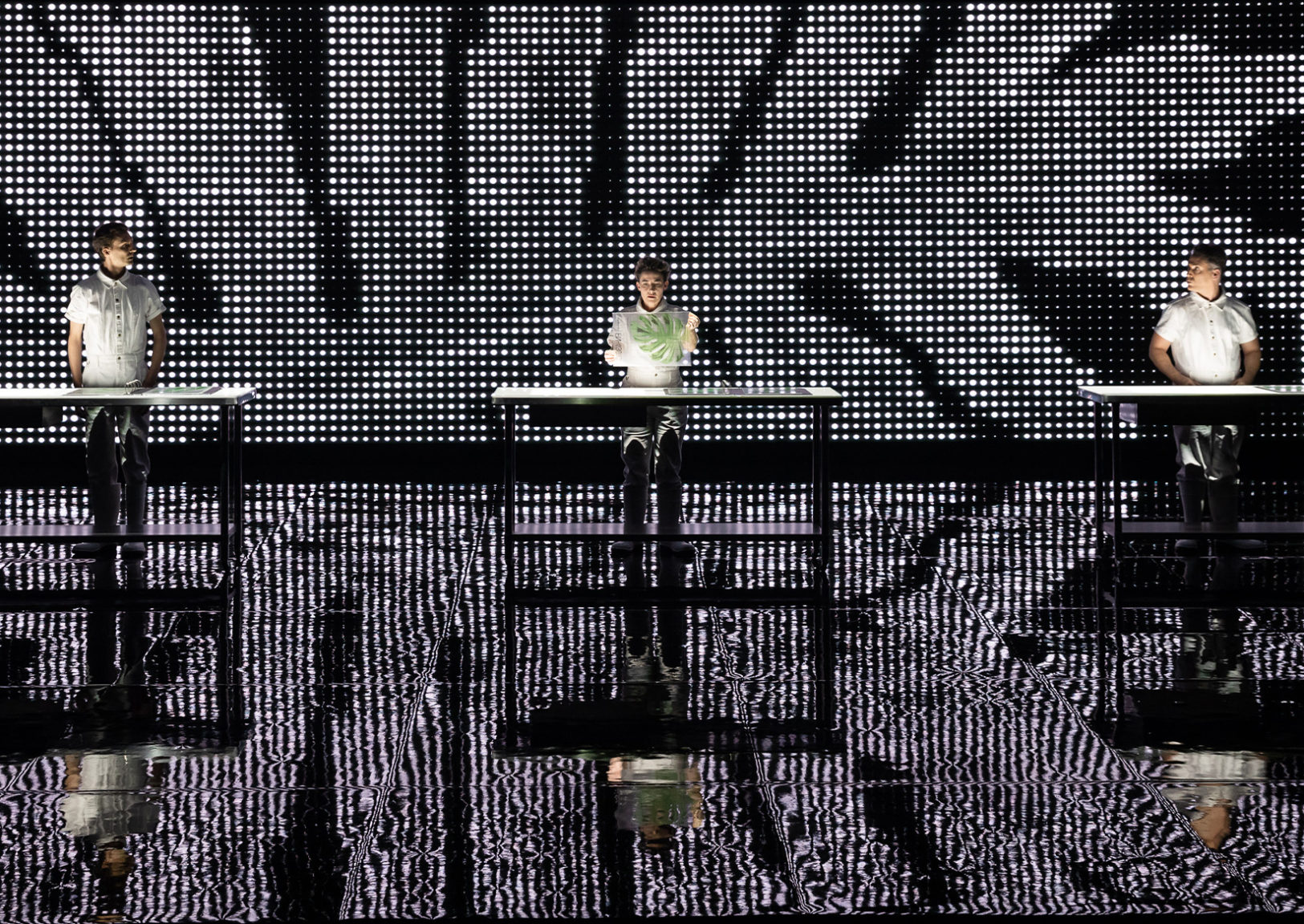TWO DIRECTORS AND A QUADRUPLE BILL
An interview with directors
Danielle Maas and Clemence Williams
By Annarosa Berman
It’s not often that two women directors get to direct four operas, all composed by women, in one over-arching bill. Yet in Sydney Chamber Opera’s quadruple bill, Breaking Glass, the all-female angle is the point: the four composers are products of Sydney University’s Composing Women program, established in an attempt at addressing the imbalance between male and female composers in the music industry.
As Danielle Maas, who directs two of the operas, Georgia Scott’s Her Dark Marauder and Josephine Macken’s The Tent, puts it: “There are extraordinary works by contemporary male composers, and yet making the conscious choice to give more space to female composers is really important – in the same way that it’s really important to give more space to creators of colour, and creators of different classes. It’s about making space for a multiplicity of perspectives when historically, male composers have had the pie almost all to themselves.”

Clemence Williams, who directs Peggy Polias’ Commute and Bree van Reyk’s The Invisible Bird, explains the logistics of two directors steering four operas that are part of a bigger whole: “We’re the captains of the ship for each individual opera, but we have an exceptional creative team who work across all four.” That in itself draws the four operas together. More importantly: “They’re young female Australian composers. They’re going to have a synergy that connects them to the whole.” While there’s room to champion the individual qualities of each of the operas, they’re always going to be seen as a group.
Williams describes Peggy Polias’ Commute as “at its simplest, about a woman’s journey home”. Inherently that journey involves fear – “Margaret Atwood said men were afraid of being laughed at and women, of being killed”. Polias’ sonic landscape vividly describes the fear women experience in the simple act of trying to get home. She’s layered her story with allusions to Greek mythology, so monsters appear along the way. Conceptualising Commute, says Williams, has been “a joy” despite the challenge of representing an internal journey on stage. “It took imagination,” she says, with a laugh. “If this were a play I would have been tearing my hair out! But the exciting thing about opera is that it allows us to exist on different plains simultaneously; we can meditate our way through, rather than go on a little journey with a character.”
Bree van Reyk’s The Invisible Bird presented a different but equally enjoyable challenge. “Bree has used the sad story of the night parrot that was thought to be extinct, only to be found again, as an allegory for women’s voices across the history of Western classical music,” says Williams. Exploring the canon from the inside out has been a deeply rewarding experience.

For Danielle Maas, whose wish list for directing includes new work, women composers and electronic music, directing Josephine Macken’s The Tent and Georgia Scott’s Her Dark Marauder, is a dream come true. The Tent is a meditation on a Margaret Atwood short story, “where the idea of creation becomes an act of self preservation in the face of ecological trauma and disaster”, Maas says. Since the work is almost completely without text, Maas imagined it as a world where language is breaking down. There’s very little emotion expressed, and there’s ambiguity as to the meaning of what people are saying. “The style of the piece has resulted in symbolism, Maas says, “which is not particularly trendy in theatre at the moment, but it felt right to create a world with several layers of ambiguity.”
In Scott’s Her Dark Marauder, once again the audience is let in on a meditative experience, rather than taken on a linear journey. Maas says: “The opera is about the main character’s relationship to her depression, and what we asked ourselves was, how do you give an audience a sensorial experience of depression? Because if we can experience what depression feels like, maybe that’s a way to empathy.”
Finding a directorial angle is what directors do best, but when directing a new opera, negotiating a complicated score for which no piano reduction or recording exists, can be a headache. Williams, a trained classical singer and percussionist, reads music fluently. “If anything I need to be reminded sometimes that there are words,” she says, with a laugh, adding that it’s “a joy and absolute thrill” to be hearing a piece of music for the very first time; to be “the first set of eyes and hands to mould it into something tangible”. Yes, Breaking Glass is full of complex music, but having written music for the theatre herself, and having recently completed a course in electronic music, Williams felt able to “unlock the components of a piece of electronic music”.
“There are extraordinary works by contemporary male composers, and yet making the conscious choice to give more space to female composers is really important – in the same way that it’s really important to give more space to creators of colour, and creators of different classes. It’s about making space for a multiplicity of perspectives when historically, male composers have had the pie almost all to themselves.”
Maas, on the other hand, when asked about difficult contemporary scores, throws up her hands up and laughs: “I’m the ultimate layman…lay woman…of opera! It’s amazing that I even work in opera because I’m musically illiterate! It’s terrifying!” But all is never lost when Breaking Glass conductor Jack Symonds is near, she adds.
“I sat down with Jack and he talked through the score and what it was doing. He’s exceptionally good at explaining what things might feel like or sound like. He’ll explain a moment to you, and he’ll go, it sounds like a decaying garden. And you’ll go, Great!” The score she was given included detailed notes by Symonds and the composers. “So you work out how you’re going to translate those notes into a dramatic experience. And once you’re in the rehearsal room, you pay attention to what every musician is doing, because their bodies respond to the music.”
Thanks at least partly to the delightful challenge of Breaking Glass, in future both directors would love to continue working in opera. As Maas puts it: “This is exactly the kind of work that I would love to make for the rest of my life.” Williams can only agree: “Making new opera with a team of accomplished professionals…it’s just terrific.”
Keep in touch
General Inquiries
- contact@sydneychamberopera.com
-
SCO, Carriageworks
PO Box 3035 Redfern, NSW 2016
Postal Address -
SCO, Carriageworks
245 Wilson St Eveleigh, NSW 2015
Resident Address - (02) 8571 9106